|
Der
isländische Dichter Gunnar Gunnarsson wurde
am 18. Mai 1889 als Sohn eines armen Bauern auf dem Hof Valþjófsstaður im
Fljótsdalur geboren. Siehe auch mein Blog vom 18. Mai 2010 und auch mein Blog vom 18. Mai 2011.
Aus: Father And
Son (Übersetzt von Peter Foote)
Snjolfur's wife worked
at fish-drying for the factor in the summer months, but good drying-days could
not be counted on and the money was not much. She lived just long enough to
bring little Snjolfur into the world, and the last thing she did was to decide
his name. From then on, father and son lived alone in the cabin.
Little Snjolfur had vague memories of
times of desperate misery. He had to stay at home through days of unrelieved
torment and agony. There had been no one to look after him while he was too
small to go off in the boat with his father, and old Snjolfur was forced to tie
the boy to the bed-post to keep him out of danger in his absence. Old Snjolfur
could not sit at home all the time: he had to get something to put in the pot.
The boy had more vivid memories of
happier times, smiling summer days on a sea glittering in the sunshine. He
remembered sitting in the stern and watching his father pulling in the gleaming
fish. But even those times were mingled with bitterness, for there were days
when the sky wept and old Snjolfur rowed out alone.
But in time little Snjolfur grew big
enough to go off with his father, whatever the weather. From then on they contentedly
shared most days and every night: neither could be without the other for more
than a minute. If one of them stirred in his sleep, the other was awake on the
instant; and if one could not get to sleep, the other did not close his eyes
either.
One might think that it was because
they had a lot to talk about that they were so wrapped up in each other. But
that was not so. They knew each other so well and their mutual confidence was
so complete that words were unnecessary. For days on end no more than scattered
phrases fell between them; they were as well content to be silent together as
to be talking together. The one need only look at the other to make himself
understood.
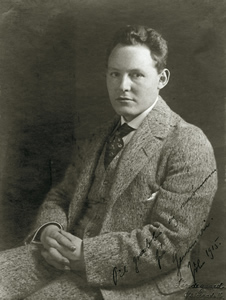
Gunnar
Gunnarsson (18. Mai 1889 - 21. November 1975)
Der
deutsche Schriftsteller und Literaturwissenschaftler W. G. (Winfried Georg) Sebald wurde
am 18. Mai 1944 in Wertach, Allgäu, geboren. Siehe auch mein Blog vom 18. Mai 2009 und auch mein Blog vom 18. Mai 2010 und auch mein Blog vom 18. Mai 2011.
Aus: Austerlitz (Übersetzt von Anthea
Bell).
Although Austerlitz did not reappear
in the Glove Market in Antwerp that June day in 1967 on which, in the end, I
went out to Breendonk, our paths kept crossing, in a way that I still find hard
to understand, on all my Belgian excursions of that time, none of them planned
in advance. A few days after our first encounter in the Salle des pas perdus of
the Centraal Station, I met him again in an industrial quarter on the
southwestern outskirts of the city of Liege, which I had reached towards
evening, coming on foot from St. Georges-sur-Meuse and Flemalle. The sun was
just breaking once again through the inky blue wall of cloud heralding a storm,
and the factory buildings and yards, the long rows of terraced housing for the
laborers, the brick walls, the slate roofs, and the windowpanes shone as if a
fire were glowing within them.
When the rain began lashing down on
the streets I took refuge in a tiny bar called, as I remember, the Cafe des
Esperances, where to my considerable surprise I found Austerlitz bent over his notes
at one of the Formica tables. On this second meeting, as on all subsequent
occasions, we simply went on with our conversation, wasting no time in
commenting on the improbability of our meeting again in a place like this,
which no sensible person would have sought out. From where we sat until late
that evening in the Cafe des Esperances, you could look through a back window
down into a valley, perhaps a place of water meadows in the past, where now the
reflected light from the blast furnaces of a gigantic iron foundry glared
against the dark sky, and I remember clearly how, as we both gazed intently at
this spectacle, Austerlitz launched into a discourse of over two hours on the
way in which, during the nineteenth century, the vision of model towns for workers
entertained by philanthropic entrepreneurs had inadvertently changed into the
practice of accommodating them in barracks just as our best-laid plans, said
Austerlitz, as I still remember, always turn into the exact opposite when they
are put into practice.
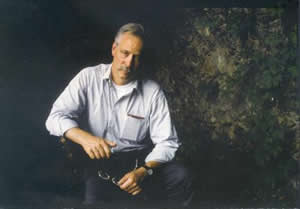
W.G.
Sebald (18. Mai
1944 14. Dezember 2001)
Der
südkoreanische Schriftsteller Yi Mun-yol wurde am 18. Mai 1948 in Yongyang geboren. Siehe auch mein Blog vom 18. Mai 2009. und auch mein Blog vom 18. Mai 2010 und auch mein Blog vom 18. Mai 2011.
Aus: L'île anonyme (Übersetzt von Patrick Maurus)
Au début du printemps de cette année-là, je venais tout juste de
quitter l'école normale, et ma pre- mière affectation avait été une école
primaire perdue dans un coin de province dont je n'ai pas particulièrement
envie de dévoi- ler le nom. Le village en question était à soixante lis* de la
bourgade où se trouvait la sous-préfecture, et, pour atteindre cette campagne,
il fallait franchir deux cols escarpés au-delà desquels personne ne semblait
vivre. En descendant le premier jour à l'arrêt du bus, sur la route en pente, je
m'étais soudain sentie envahie par un terrible sentiment de solitude. Les
hautes montagnes étaient comme les murs d'une prison où j'allais devoir passer
le restant de mes jours, et le village au loin, malgré sa centaine de maisons,
semblait une ruine déserte. Quant à l'école que je devais chercher, elle
restait invisible, ensevelie dans l'ombre d'une montagne.
Entre-temps, les deux ou trois
personnes qui étaient descendues du bus avec moi avaient déjà disparu, j'ai
fait quelques pas, pensant demander mon chemin à l'épicerie de l'endroit.
Avais-je fait trois ou quatre pas? Le sentiment d'être transpercée par une
lueur aiguë m'a immobilisée. J'ai regardé devant moi, il n'y avait qu'un type
assis sur l'estrade de l'épicerie et qui me toisait d'un air distrait. Son
pantalon usé et crasseux était fait d'une étoffe méconnaissable et en guise de
veste il portait une parka militaire teinte en noir, aux manches élimées, aux
boutonnières déchirées. J'ai examiné son visage, m'interrogeant sur la
provenance de cette lueur perçante. Un visage émacié, mat, le nez assez haut,
des pommettes... A cet instant précis, j'ai senti à nouveau la lueur
transpercer ma peau. C'était bien son regard, l'instant d'après couvert d'un
voile de folie.
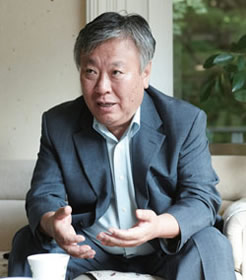
Yi Mun-yol (Yongyang, 18. Mai 1948)
Der
deutsche Schriftsteller Ernst Wiechert
wurde am 18. Mai 1887 im Forsthaus Kleinort bei Sensburg in Ostpreußen geboren.
Siehe auch mein Blog vom 18. Mai 2010 und auch mein Blog vom 18. Mai 2011.
Aus: Der Knecht Gottes Andreas
Nyland
Ich war im Zorn von Gott gegangen. Schon im
"Wald" hatte ich die Faust an seine Tür geschlagen, weil der Soldat,
durch das Chaotische das wahre Antlitz der Welt erblickend, von ihr hatte sagen
müssen. "Und siehe, es war nicht gut."
Ich ging durch die Zeit wie durch eine finstere Nacht. Die Gründe wankten, und
unter den Sternen lag ein Licht wie über den Küsten von Patmos. Allerorten
geschah die Geburt der Propheten, und aus Leidenschaft und Schmerz entstand der
"Totenwolf". Nicht mehr schlug ich nur an Gottes Tür. Ich riß sie auf
und stand vor seinem Thron, und ohne Demut sprach ich, hart und böse, als sitze
ein schuldiger Mensch vor meiner Klage. Und hart und böse verließ ich sein
Haus, um in die leere Welt zu gehen.
Sie war leer. So leer, daß ich vor ihr stand
wie vor einem gläsernen Haus, durch das ich hindurchblicken konnte. Wand und
Raum, und dahinter sah ich die Öde des Tages und die Dumpfheit der Nacht. Da
ging ich an die Grenzen der Welt und setzte mich nieder, dem Leben den Rücken
wendend, und begann zu bedenken, was mein Leben bisher erfüllt hatte: Menschen
und Dinge, Amt und Tätigkeit, Religionen und Parteien. Und als ich das alles
zwischen meinen Fingern hin und her wendete, als ich von allem den Staub
wischte, mit dem der Lärm der Jahre und der Straßen es bedeckt hatte, da
erschrak ich tief. Denn es zerbröckelte zwischen meinen Händen, was mir als
ewig erschienen war: es verblaßte vor meinen Augen, was glänzend am Rand meiner
Träume gestanden hatte.
Und was zurückblieb, aller Namen und Dogmen entkleidet, ein paar Menschen,
Erkenntnisse und Bewußtheiten: es hob sich wie aus einem tiefen Wasser, anderen
Zeiten und Welten angehörig.
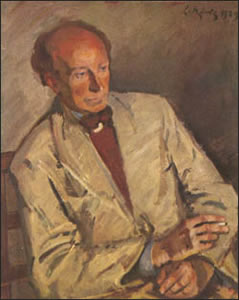
Ernst Wiechert (18. Mai 1887 24. August 1950)
Der
persische Dichter, Mathematiker und Philosoph Omar Khayyám wurde am 18.
Mai 1048 in Nayschapur/Iran geboren. Siehe auch mein Blog vom 18. Mai 2011.
Aus: Mystische Rubaiyate (Übersetzt von Horst Rinner)
Jede Zelle ruft Dir zu:
Wir sind ein Teil von Gottes Plan,
Die Schöpfung fließt in sichrer Ruh,
Gemeinsam fing das Leben an.
Hab niemals demutsvoll bereut,
Noch Asche auf mein Haupt gestreut.
Wenn streng der Richter einst erscheint,
Hab Gott ich dennoch nie verneint.
Ein alter Mann im Rausch verfangen
Sagt lallend mir auf meine Frage:
Trink Wein, so viele sind gegangen,
Doch keine Nachricht kam zu Tage.
Wenn Du, vom roten Wein berauscht,
Der Liebsten Zärtlichkeiten lauschst,
Genieß es jetzt in dieser Zeit,
Das große Nichts liegt gar nicht weit.

Omar Khayyam (18. Mai 1048 4. Dezember 1131)
Der
deutsche Dichter
und Schriftsteller Markus Breidenich wurde am 18. Mai 1972
in Düren geboren. Er studierte Physik und Mathematik in Aachen.
Er promovierte in Theoretischer Physik
am Max-Planck-Institut in Potsdam.
Breidenicht hat in Zeitschriften (zB Kraut
Garten, Poetenladen
(Magazin), Lauter niemand, außer.dem, Macondo)
und in Anthologien veröffentlicht.
Im Jahre 2009 veröffentlichte er sein
Band "Das Pochen der Echolote." Er
lebt und arbeitet in München.
Grauer Star
Die alten Lider. Im Scheinwerferlicht
noch einmal der große Wurf eines
Schattens. Für Augenblicke. Für jetzt
ist diese Landschaft von Höhen und
Tiefen ein immer noch schöner
Fleck auf der Retina. Etwas, das
dunkler wird. Trübe hinter den Linsen.
Aber nicht unterzukriegen ist. Ein
Mythos. Ein stilles, spätes Come back.
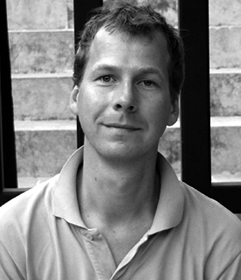
Markus
Breidenich (Düren, 18. Mai 1972)
18-05-2012 om 18:34
geschreven door Romenu 
Tags:Gunnar Gunnarsson, W.G. Sebald, Yi Mun-yol, Ernst Wiechert, Omar Khayyam, Markus Breidenich, Romenu
|
